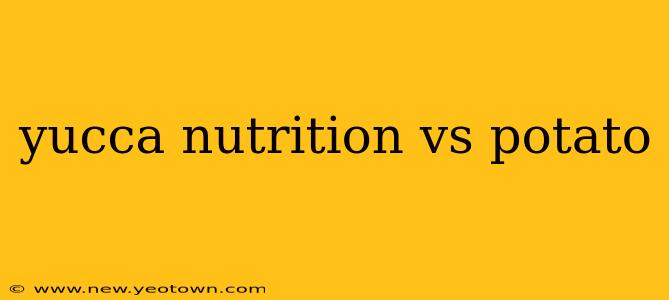Yucca vs. Potato: A Nutritional Showdown in the Starch Stakes
The humble potato and the often-overlooked yucca are both starchy staples in many cuisines around the world, offering distinct flavors and textures. But when it comes to nutrition, how do these two compare? Let's delve into a detailed nutritional comparison, exploring their similarities, differences, and which might better suit your dietary needs. This isn't just a simple calorie count; we'll uncover the rich tapestry of vitamins, minerals, and potential health benefits each root vegetable boasts.
Imagine this: you're planning a hearty meal, and you're torn between fluffy mashed potatoes and a vibrant yucca frita. The decision, it turns out, might depend more on your nutritional goals than your culinary preference.
What are the nutritional differences between yucca and potatoes?
Both yucca and potatoes are excellent sources of carbohydrates, providing the body with energy. However, their nutritional profiles diverge beyond this basic similarity. Yucca generally boasts a higher concentration of certain vitamins and minerals.
Potato: Potatoes are a good source of vitamin C, potassium, and fiber (especially when consumed with the skin). They also contain some vitamin B6 and manganese. However, the nutritional content can vary significantly depending on the type of potato (russet, sweet, red, etc.) and how it's prepared. Frying, for instance, drastically increases the fat and calorie content.
Yucca: Yucca shines in its higher fiber content, contributing to better digestive health. It also packs a more significant punch of vitamin C, potassium, and several B vitamins compared to a standard potato. Furthermore, yucca is a source of resistant starch, a type of fiber that feeds beneficial gut bacteria, contributing to improved gut health.
What are the benefits of eating yucca?
Beyond its impressive vitamin and mineral profile, yucca offers several potential health benefits:
-
Improved Digestion: The high fiber content in yucca promotes regular bowel movements and helps maintain a healthy gut microbiome.
-
Boosted Immunity: The substantial vitamin C content acts as a powerful antioxidant, strengthening the immune system and protecting cells from damage.
-
Enhanced Heart Health: Potassium, abundant in yucca, is vital for regulating blood pressure and maintaining a healthy heart.
-
Potential Anti-Inflammatory Effects: Some research suggests that yucca may possess anti-inflammatory properties, though more research is needed to confirm these benefits definitively.
Are potatoes healthier than yucca?
There's no simple "yes" or "no" answer to this question. Both potatoes and yucca offer nutritional value. However, yucca generally boasts a higher concentration of certain vitamins, minerals, and fiber. The best choice depends on your individual needs and dietary goals. If you're looking to maximize fiber intake and boost certain micronutrients, yucca might be a better option. Potatoes, while less nutrient-dense in comparison, remain a readily available and versatile source of carbohydrates and essential nutrients.
What are the health risks of eating too much yucca?
While generally safe, consuming excessive amounts of yucca can lead to digestive issues such as bloating and gas due to its high fiber content. Additionally, raw yucca contains cyanogenic glycosides, which can release cyanide when ingested. However, proper cooking methods (boiling, roasting, frying) effectively neutralize these compounds.
Is yucca good for weight loss?
Yucca's high fiber content can contribute to weight management by promoting satiety and regulating blood sugar levels. However, it's crucial to remember that weight loss is a complex process influenced by various factors, including overall diet, exercise, and genetics. Yucca, while potentially beneficial, shouldn't be considered a magic bullet for weight loss.
Is yucca a good source of carbohydrates?
Yes, both yucca and potatoes are excellent sources of carbohydrates, providing the body with energy. However, the type of carbohydrates and their impact on blood sugar levels differ somewhat between the two. Yucca, due to its resistant starch content, might have a lower impact on blood sugar compared to potatoes.
In conclusion, both yucca and potatoes offer valuable contributions to a balanced diet. The best choice depends on your individual needs and preferences. Consider incorporating both into your diet for a diverse range of nutrients and flavors. Remember always to consult with a healthcare professional or registered dietitian before making significant dietary changes, especially if you have underlying health conditions.

